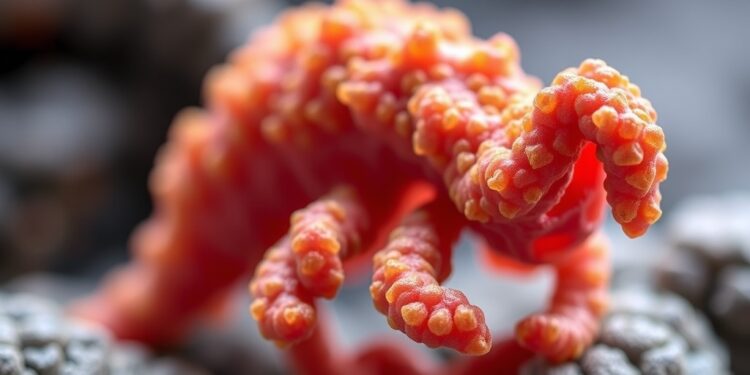
In the landscape of cancer treatment, radiation therapy stands as a cornerstone, utilized by approximately 60 percent of patients in the United States. However, the promise of this potent therapeutic modality comes at a cost, as many individuals experience debilitating side effects. These adverse reactions can manifest as severe pain or complications that inhibit the ability to eat or drink, leading to significant patient distress and treatment delays. Researchers at the Massachusetts Institute of Technology (MIT), in collaboration with Brigham and Women’s Hospital and the University of Iowa, have recently embarked on a tantalizing exploration of a potential solution inspired by a remarkable creature known as the tardigrade.
Tardigrades, often referred to as “water bears,” are microscopic organisms that exhibit the extraordinary ability to withstand extreme environmental stressors, including high levels of radiation. These nearly indestructible beings can thrive in conditions that would be fatal to most life forms. This innate resilience has sparked the interest of scientists looking for novel ways to protect normal tissues from the deleterious effects of radiation during cancer therapy.
The pioneering team has developed a strategy that harnesses the unique properties of a protein produced by tardigrades, known as Dsup, which serves to safeguard DNA from radiation-induced damage. When the research team proceeded to inject messenger RNA skilled in encoding this protein into murine models, they observed a marked efficacy; the resulting Dsup protein successfully conferred a protective shield around the cellular DNA against the ravages of radiation exposure. If this strategy progresses to clinical application in humans, it could represent a transformative leap forward in treating cancer while minimizing collateral damage to healthy tissues.
Explaining the significance of their breakthrough, Giovanni Traverso, an associate professor at MIT and a gastroenterologist at Brigham and Women’s Hospital, emphasized the critical need to address the side effects associated with radiation therapy. Many patients face intolerable consequences such as inflammation in the mouth or rectum due to radiation, leading to difficulties in swallowing, eating, or, in severe cases, necessitating hospitalization. The dire need for protective strategies in cancer treatment is manifested in the discomfort and risks that accompany conventional radiation protocols.
The team led by Traverso and his colleague James Byrne has made significant strides toward formulating new solutions for mitigating the toxicities of radiation exposure. While a handful of drugs exist to attempt to reduce damage from radiation therapy, their effectiveness is limited. Furthermore, current protective measures, such as hydrogels for prostate cancer radiation treatments, do not address the broader spectrum of complications experienced by many cancer patients receiving radiation.
Inspired by tardigrades and their survival mechanisms, the research team focused on Dsup protein’s role in defending DNA from radiation. This protein allows tardigrades to survive radiation levels thousands of times higher than those lethal to humans. The researchers proposed using mRNA encoding for Dsup to instruct human cells to produce the protective protein before administering radiation therapy. This approach posits a transient expression that acts directly at the cellular level to enhance resilience whilst limiting potential long-term risks associated with genetic manipulation.
For successful implementation, the research necessitated the development of an effective delivery mechanism for the mRNA. After rigorous experimentation, the researchers identified polymer-lipid nanoparticles that efficiently transported mRNA to target tissues. By optimizing these delivery systems, they combined the properties of various materials, achieving both the potency required for the delivery of the mRNA and the specificity needed to avoid unintended effects.
In preclinical trials conducted on mice, the research team demonstrated the potential of their approach. By administering nanoparticle-encapsulated mRNA near the targeted areas before radiation exposure, they successfully reduced the occurrence of double-stranded DNA breaks—effectively cutting the damage inflicted by radiation in half. Importantly, they noted that the protective effects were localized, ensuring that tumor tissues remained vulnerable to radiation while safeguarding adjacent healthy cells.
Moving forward, the remarkable findings provoke further questions regarding the translation of this therapeutic paradigm into human applications. The core challenge lies in developing a variant of the Dsup protein that does not incite an immune response, as the introduction of foreign proteins could lead to unintended inflammatory reactions in human patients. If this obstacle can be successfully navigated, the implications for cancer treatment could be profound—offering not just protection from radiation but potentially safeguarding healthy tissues from the side effects of chemotherapy drugs.
Beyond oncology, there is a promising horizon for this research. Consideration is being given to the potential application of Dsup-derived therapies in protecting astronauts from radiation exposure during prolonged space missions, an area that is increasingly relevant as space travel becomes more commonplace. The global interplay between cancer treatment, space exploration, and biomedical innovation leaves an exciting landscape for future discoveries.
This groundbreaking work, which recently made its debut in the prestigious journal Nature Biomedical Engineering, encapsulates a modern approach to an age-old challenge in medicine. The confluence of marine biology and cancer research exemplifies the innovative thinking emerging from interdisciplinary collaboration. As researchers continue to explore the depths of nature for solutions to human health challenges, the hope remains that strategies exemplified by the humble tardigrade may help change the trajectory of cancer care.
The ongoing studies underscore the value of basic research in uncovering novel therapeutic avenues and showcase the extraordinary capabilities of biological systems in extreme conditions. The next steps involve extensive preclinical and clinical trials to verify safety and efficacy before mRNA therapies become part of standard cancer care. As science continues to unravel the secrets hidden within the natural world, the potential for revolutionary breakthroughs in medicine continues to grow, steadily illuminating paths toward enhanced patient care and novel treatment strategies.
Subject of Research:
Article Title:
News Publication Date:
Web References:
References:
Image Credits:
Keywords:
Tags: Brigham and Women’s Hospital researchcancer treatment advancementsDsup protein and DNA protectionenhancing radiation therapy toleranceextreme resilience of tardigradesimproving patient quality of life during radiationmicroscopic organisms in medical scienceMIT cancer research innovationsnovel cancer treatment strategiesprotecting normal tissues in radiation therapyreducing side effects of radiation treatmenttardigrade protein in cancer therapy





